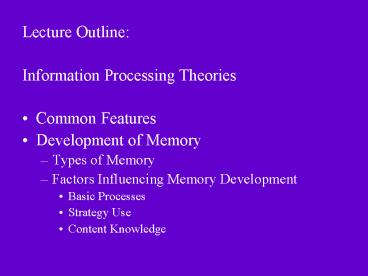Lecture Outline: - PowerPoint PPT Presentation
Title:
Lecture Outline:
Description:
Lecture Outline: Information Processing Theories Common Features Development of Memory Types of Memory Factors Influencing Memory Development Basic Processes – PowerPoint PPT presentation
Number of Views:76
Avg rating:3.0/5.0
Title: Lecture Outline:
1
- Lecture Outline
- Information Processing Theories
- Common Features
- Development of Memory
- Types of Memory
- Factors Influencing Memory Development
- Basic Processes
- Strategy Use
- Content Knowledge
2
- Information Processing Theories
- Common Features
- Cognitive development is viewed as continuous
rather than discontinuous
3
- Comparisons are drawn between information
processing of computers and that of humans - Computers ability to process information is
limited by its - Hardware (e.g., memory capacity, speed/efficiency
of operations) - Software (e.g., strategies, information
available) - Individuals thinking is limited by
- Memory capacity
- Speed/efficiency of thought processes
- Availability of relevant strategies and knowledge
4
- Development of Memory
- Types of Memory
- Short-term (working) memory Workspace in
which information is actively processed - Can hold and operate on between 1 and 10 items
(words, numbers, etc.) for up to a minute - Capacity and speed of operation increases greatly
over the course of childhood and adolescence
5
- Long-term memory Information retained on an
enduring basis - Can hold an unlimited amount of information for
unlimited periods of time - Includes knowledge and skills
- Long-term memory increases over the course of
childhood and adolescence
6
- What Factors Influence Memory Development?
- Basic Processes
- Simple, most frequently used mental activities
- Exs recognizing objects as familiar recalling
facts and procedures generalizing from one
instance/event to another encoding
7
- Encoding Process of representing in memory
information that draws attention or is considered
important
8
(No Transcript)
9
- Speed/efficiency of basic processes increases
most rapidly during childhood but continues to
increase through adolescence
10
- Strategy Use
- Strategy A general plan or set of plans
intended to achieve a goal
11
- Specific Memory Strategies
- Rehearsal Repetition of information
- Spontaneous use of this strategy emerges around
age 5 - Repeat an item as it is presented
- Younger children do not typically use cumulative
rehearsal (repeating all items in a list each
time a new item is added) - When younger children are instructed to use
cumulative rehearsal, memory performance improves
12
- Organization Grouping items on the basis of
similarity - By approximately 10-11 years, children tend to
recall related items together - When younger children are instructed to use
organization, memory performance improves
13
- Elaboration Creating a meaningful relationship
between two items (verbally or visually) - Typically tested using paired-associates
procedure - Two words are paired (e.g., bear-blanket)
- Test One word is presented and participant must
recall other word - Children rarely use elaboration spontaneously
- If instructed to use visual or verbal
elaboration, memory performance improves
14
- Content Knowledge
- Greater knowledge increases childrens ability to
remember new information because they can relate
it to information they already know - When children know more about a topic than
adults, their memory for new information about
the topic is often better than that of adults - Ex Chi (1978)
- Tested memory for novel chessboard arrangements
in child chess experts and novice adults
15
- Scripts A type of knowledge about how some type
of everyday event usually goes - Ex eating at a restaurant grocery shopping































